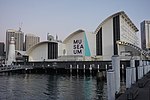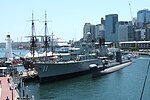Pyrmont Bay ferry wharf
Ferry wharves in SydneyPages with no open date in Infobox stationPyrmont, New South WalesUse Australian English from March 2015

Pyrmont Bay ferry wharf is located on the western side of Darling Harbour serving the inner-city Sydney suburb of Pyrmont. It is located adjacent to the Australian National Maritime Museum and close to The Star Casino.
Excerpt from the Wikipedia article Pyrmont Bay ferry wharf (License: CC BY-SA 3.0, Authors, Images).Pyrmont Bay ferry wharf
Waterfront Promenade, Sydney Sydney
Geographical coordinates (GPS) Address Nearby Places Show on map
Geographical coordinates (GPS)
| Latitude | Longitude |
|---|---|
| N -33.86845 ° | E 151.19873333333 ° |
Address
Pyrmont Bay Wharf
Waterfront Promenade
2000 Sydney, Sydney
New South Wales, Australia
Open on Google Maps











